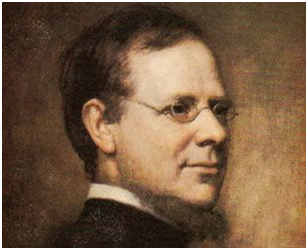It was called Americanism. Pope Leo XIII (1810-1903) condemned it.
In 1899 Leo XIII sent a three-page letter to the U.S. bishops in care of Cardinal
James Gibbons (1834-1921) of Baltimore. It is titled Witness to Our Good or sometimes
On New Opinions of Virtue, Nature and Grace. Leo XIII’s admonishment was aimed at
progressive U.S. Catholics. Its general theme speaks to today’s U.S.
Catholics—conservatives and liberals.
The second paragraph of Witness to Our Good mentions Fr. Isaac Hecker, CSP
(1819-1888), the principal founder of the Paulists. Hecker himself was not Leo XIII’s
villain. In fact, Hecker died more than ten years before the papal letter. Rather, as Leo
XIII says, a translated biography of Hecker, written in 1891 by Fr. Walter Elliott, CSP
(1842-1928), “has caused no little controversy” in Europe. Leo XIII goes on to name the
erroneous traits of Americanism as conveyed in the biography, more specifically in its
French introduction by Fr. Felix Klein (1862-1953), a professor of philosophy and
literature in Paris.
Hecker desired a Catholicism appealing to North Americans, rather than one
dependent upon European languages, customs, theological formulae and rituals.
Hecker was optimistic that our country’s pluralism, religious freedom, voluntary
associations, layered authority and individual striving are harmonious with Catholicism.
Hecker’s disposition toward the U.S. emerged amid a strong anti-Catholic
movement among nativists. Contrary to their attitude, Hecker believed that Catholicism
makes a positive contribution to our country. Further, the church learns from give-and-
take in our modern world. Thus to live the gospel within the specific conditions of North
America requires Christians to engage, humanize and civilize their surroundings, said
Hecker.
Of course, Hecker’s view can go too far. When Christianity is fused with any one
culture or political regime, religion is debased. Public figures, as we know, can coopt
religion for their own ambitions.
What is it like in the U.S. today? Our libertarian culture makes individual choice
the highest value. Freedom is equated with options, devoid of pre-set, firm obligations.
Decisions in our culture are always circumstantial, not directed by any absolutes. A term
like alternative facts is accepted as rational. Thus some—conservatives and
liberals—are cafeteria Catholics. That is, their faith being captured by our individualistic
culture, they select some Catholic markers of identity while ignoring some basics. A
cafeteria Catholic might say, for example, that any individual woman has an
unencumbered, autonomous right to abortion. Or a cafeteria Catholic might say that
assisting refugees, immigrants or others in need is an individual’s choice, not obligatory
in any way.
Leo XIII’s main concern in Witness to Our Good is the danger of religion over-
embracing a particular culture, society or political order. Yes, patriotism is healthy. In the
U.S. our patriotism is devotion to and respect of our experiment in democracy,
regardless of anyone’s religion or birthplace. Be aware, however, that healthy patriotism
differs from nationalism: The attitude that our country is ipso facto superior, that it
stands alone, that it is destined to expand with never an apology. A Christian nationalist
uses religion to distort history, to excuse the serious shortcomings of their political
favorites, to claim the superiority of their type of Christian over other denominations and
to favor their race or ethnicity over others.
Perhaps Leo XIII’s Witness to Our Good would have better made the point
without dragging Hecker or an obscure introduction to a biography into it. Like his
predecessor, Chicago’s-own Pope Leo XIV must deal with the position of Catholicism
within U.S. culture, and other cultures as well. He knows that some U.S. Catholics,
including its leaders, have bought big time into our extreme style of individualistic
capitalism and the political policies supporting it. There are also a few Catholics who,
reacting to the defects in our culture, opt for sectarianism, a trip to an imagined golden
age. This retreat is no better.
A genuine Catholic life “in our age,” says Hecker, must take its place “in busy
marts, in counting rooms, in workshops, in homes and in the varied relations that form
human society, and it is into these that sanctity is to be introduced… [We are to] seek
occasions to practice virtue, to do something for God, and these occasions are, if I may
use the expression, right under our noses.”
Fr. Isaac Hecker, CSP (1819-1888)
Droel is associated with National Center for the Laity (PO Box 291102, Chicago, IL
60629). It distributes a new edition of Leo XIII’s encyclical, On the Condition of Labor
($7).













